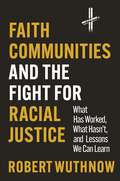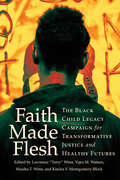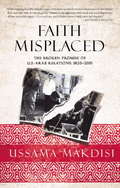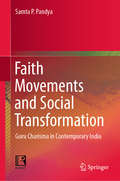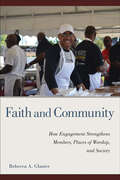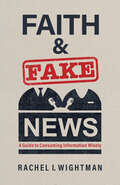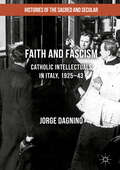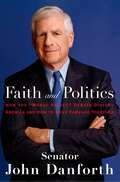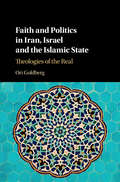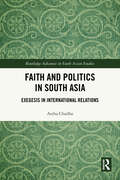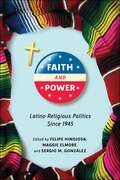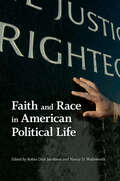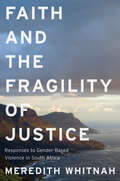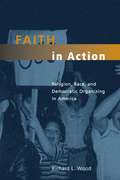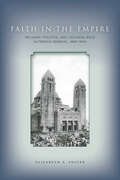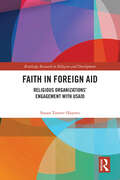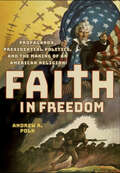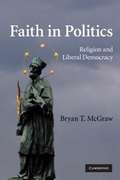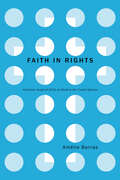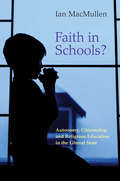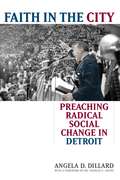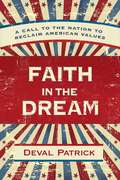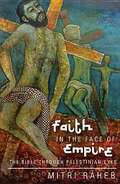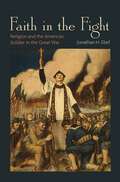- Table View
- List View
Faith Communities and the Fight for Racial Justice: What Has Worked, What Hasn't, and Lessons We Can Learn
by Robert WuthnowThe communities, congregations, and faith-based coalitions that have been working for racial justice over the past fifty yearsHave progressive religious organizations been missing in action in recent struggles for racial justice? In Faith Communities and the Fight for Racial Justice, Robert Wuthnow shows that, contrary to activists&’ accusations of complacency, Black and White faith leaders have fought steadily for racial and social justice since the end of the Civil Rights movement of the 1950s and 1960s. Wuthnow introduces us to the communities, congregations, and faith-based coalitions that have worked on fair housing, school desegregation, affirmative action, criminal justice, and other issues over many years. Often overshadowed by the Religious Right, these progressive faith-based racial justice advocates kept up the fight even as media attention shifted elsewhere.Wuthnow tells the stories of the faith-based affordable housing project in St. Louis that sparked controversy in the Nixon White House; a pastor&’s lawsuit in North Carolina that launched the nation&’s first busing program for school desegregation; the faith outreach initiative for Barack Obama&’s presidential campaign; and church-mobilized protests following the deaths of Trayvon Martin, Freddie Gray, and George Floyd. Drawing on extensive materials from denominations, journalists, and social scientists, Wuthnow offers a detailed and frank discussion of both the achievements and the limitations of faith leaders&’ roles. He focuses on different issues that emerged at different times, tracing the efforts of Black and White faith leaders who sometimes worked cooperatively and more often tackled problems in complementary ways. Taken together, these stories provide lessons in what faith communities have done and how they can better advocate for racial justice in the years ahead.
Faith Made Flesh: The Black Child Legacy Campaign for Transformative Justice and Healthy Futures (Publicly Engaged Scholars: Identities, Purposes, Practices)
by Lawrence “Torry” Winn, et al.Faith Made Flesh brings together the experience, insight, and stories of those actively addressing societal and educational disadvantages of Black children in Sacramento, California. Editors Lawrence "Torry" Winn, Vajra M. Watson, Maisha T. Winn, and Kindra F. Montgomery-Block seek to offer viable solutions to racial injustice by centering the voices of organizers, policymakers, educators, scholars, and young people alike. Focused on the Black Child Legacy Campaign (BCLC), a ten-year community-driven initiative to respond to disproportionate health outcomes, the contributors analyze the impact of the BCLC's successes, providing an empirically rich narrative of its transformative alliances and radical actions. Through timely and urgent case studies and personal reflections, Faith Made Flesh advances the need to address societal challenges through creative engagement with diverse institutional and individual stakeholders. The findings offer an innovative model to other regions aiming to cultivate thriving community-city-school partnerships that center the well-being of Black children and Black futures.
Faith Misplaced: The Broken Promise of U.S.-Arab Relations: 1820-2001
by Ussama MakdisiAn award-winning historian presents a controversial and dramatic portrait of America's interaction with the Arab world?and the defining choice that squandered years of carefully built good relations
Faith Movements and Social Transformation: Guru Charisma In Contemporary India
by Samta P. PandyaThis book examines the role of Hindu-inspired faith movements (HIFMs) in contemporary India as actors in social transformation. It further situates these movements in the context of the global political economy where such movements cross national boundaries to locate believers among the Hindu diaspora and others. In contemporary neoliberal India, HIFMs have become important actors, and they realize themselves by making public assertions through service. The four pillars of the contemporary presence of such movements are: gurus, sociality, hegemony and social transformation. Gurus, who spearhead these movements, create a matrix of possible meanings in their public discourses which their followers pick up to create messages of personal and social change. Sociality is a core strategy of proliferation across such movements and implies social service, which is qualified by memories of the guru and what they are believed to embody. Hegemony is reflected in the fact that social service in such movements often ominously imbibes right-wing or far-right Hinduism. They propose a model of Hindu-inspired social transformation, involving faith building into and transforming the civil society. The book discusses in a nuanced way several Hindu-inspired faith movements of various hues which have made national and international impact.This topical book is of interest to students and researchers in the fields of sociology, anthropology, social work, and social psychology, with a special interest in the study of religious movements.
Faith and Community: How Engagement Strengthens Members, Places of Worship, and Society (Religious Engagement in Democratic Politics)
by Rebecca A. GlazierPlaces of worship are important anchor institutions in communities, helping to create social capital through discussion groups, soup kitchens, and neighborhood clean-ups. While congregations face increasing pressures, from declining attendance to political polarization, community engagement is an overall positive for their members and for democracy. Faith and Community shows the benefits of religious people taking action in their communities. Through more than a decade of multi-method data collection, Rebecca Glazier surveyed over 4,000 congregants and nearly 500 clergy in Little Rock, Arkansas to gather opinions from members and leaders on community issues and engagement. Together with interviews and case studies, her findings indicate that active congregants are happier and more civically involved. Faith and Community provides valuable insights into the relationship between religion and community engagement. The data illustrates how community engagement benefits individuals, congregations, and democracy and offers one solution to what ails religion in America today.
Faith and Fake News: A Guide to Consuming Information Wisely
by Rachel I. WightmanShare if you love Jesus. Scroll past if you follow the devil. Most Christians have seen something asinine like this on Facebook and rightly dismissed it. But not every post on social media is so obviously absurd. As online spaces increase in importance, it is urgent that we as Christians consider how to love our neighbors on the internet—and this includes sharing the truth.Rachel I. Wightman has seen this problem firsthand as a librarian with over a decade of experience instructing students in information literacy. In Faith and Fake News, she shares her expertise with average Christians. This timely and essential guide explains the information landscape and its tendency toward thought bubbles, discusses techniques for fact-checking and evaluating sources, and offers suggestions on ways to engage with our neighbors online while bearing witness to Christ and the truth.
Faith and Fascism
by Jorge DagninoThis is a study of the Federazione Universitaria Cattolica Italiana (FUCI) between 1925 and 1943, the organisation of Catholic Action for the university sector. The FUCI is highly significant to the study of Catholic politics and intellectual ideas, as a large proportion of the future Christian Democrats who ruled the country after World War II were formed within the ranks of the federation. In broader terms, this is a contribution to the historiography of Fascist Italy and of Catholic politics and mentalities in Europe in the mid- twentieth century. It sets out to prove the fundamental ideological, political, social and cultural influences of Catholicism on the making of modern Italy and how it was inextricably linked to more secular forces in the shaping of the nation and the challenges faced by an emerging mass society. Furthermore, the book explores the influence exercised by Catholicism on European attitudes towards modernisation and modernity, and how Catholicism has often led the way in the search for a religious alternative modernity that could countervail the perceived deleterious effects of the Western liberal version of modernity.
Faith and Politics
by Senator John DanforthSenator John Danforth , an ordained Episcopal priest and former U. S. senator, writes about one of the most conflictridden issues in America: the intersection of government and religion. In Faith and Politics, he takes on many of the polarizing hot-button issues, including stem- cell research, abortion, school prayer, and gay marriage. He expresses dismay at his party for at times straying from traditional Republican principles to pursue an agenda of "wedge" issues. We must, Danforth appeals, move forward together, drawing on our faith to help us live as one nation. Danforth's book is a much-needed clarion call to all Americans.
Faith and Politics in Iran, Israel and the Islamic State: Theologies of the Real
by Goldberg OriReligious faith has been gaining in reach and influence throughout global politics over the last three decades, most prominently in the Middle East, and theologies of this nature are based on the understanding that faith in God is to be based, primarily and predominantly, on the realness of God's presence. The West, accustomed to its own discussion on religion and politics emphasising democracy and individual freedoms, has been at a loss to explain and engage these rising religious polities. Through an innovative approach to the role of faith in politics, Faith and Politics in Iran, Israel, and the Islamic State considers political theologies of the real formulated during the twentieth century and proposes that, while religion in the West has been committed to absolutist vision, these theologies have drawn their strength from a commitment to their concrete, divinely infused reality.
Faith and Politics in South Asia: Exegesis in International Relations (Routledge Advances in South Asian Studies)
by Astha ChadhaThis book explores the role of faith and politics in shaping the international relations of South Asia. Adopting a neo-classical realist framework and a discourse-historical approach to analyze how religious actors construct their political identities and interests through the interpretation of sacred texts, or exegesis, the book makes several key contributions to the field of international relations. It introduces the concept of exegesis as a novel analytical tool to understand the role of religion in world politics. The book argues that exegesis is not only a theological exercise, but also a political one, as it shapes the worldviews, values, norms, and interests of religious actors. The author applies exegesis to three case studies of South Asia: the partition of India and Pakistan, the rise of Hindu nationalism in India, and the emergence of Islamic radicalism in Pakistan and resurging signs of the same in Bangladesh. The research then challenges the conventional assumptions of IR, such as the secularization thesis, the clash of civilizations, and the rational actor model, by showing how religious actors are not monolithic, homogeneous, or irrational, but rather diverse, heterogeneous, and strategic. The book offers a nuanced and comprehensive understanding of the role of religion in world politics, especially in the context of South Asia. Highlighting the diversity and complexity of the religious landscape in South Asia, which is home to various faiths, sects, movements, and ideologies, this book will be of interest to academics studying global politics, international relations, Asian Studies, and studies on religion and foreign policy.
Faith and Power: Latino Religious Politics Since 1945
by Felipe Hinojosa, Maggie Elmore, and Sergio M. GonzálezIlluminates how religion has shaped Latino politics and community buildingToo often religious politics are considered peripheral to social movements, not central to them. Faith and Power: Latino Religious Politics Since 1945 seeks to correct this misinterpretation, focusing on the post–World War II era. It shows that the religious politics of this period were central to secular community-building and resistance efforts. The volume traces the interplay between Latino religions and a variety of pivotal movements, from the farm worker movement to the sanctuary movement, offering breadth and nuance to this history. This illuminates how broader currents involving immigration, refugee policies, de-industrialization, the rise of the religious left and right, and the Chicana/o, immigrant, and Puerto Rican civil rights movements helped to give rise to political engagement among Latino religious actors. By addressing both the influence of these larger trends on religious movements and how the religious movements in turn helped to shape larger political currents, the volume offers a compelling look at the twentieth-century struggle for justice.
Faith and Race in American Political Life (Race, Ethnicity, and Politics)
by Robin Dale Jacobson and Nancy D. WadsworthDrawing on scholarship from an array of disciplines, this volume provides a deep and timely look at the intertwining of race and religion in American politics. The contributors apply the methods of intersectionality, but where this approach has typically considered race, class, and gender, the essays collected here focus on religion, too, to offer a theoretically robust conceptualization of how these elements intersect--and how they are actively impacting the political process.ContributorsAntony W. Alumkal, Iliff School of Theology * Carlos Figueroa, University of Texas at Brownsville * Robert D. Francis, Lutheran Services in America * Susan M. Gordon, independent scholar * Edwin I. Hernández, DeVos Family Foundations * Robin Dale Jacobson, University of Puget Sound * Robert P. Jones, Public Religion Research Institute * Jonathan I. Leib, Old Dominion University * Jessica Hamar Martínez, University of Arizona * Eric Michael Mazur, Virginia Wesleyan College * Sangay Mishra, University of Southern California * Catherine Paden, Simmons College * Milagros Peña, University of Florida * Tobin Miller Shearer, University of Montana * Nancy D. Wadsworth, University of Denver * Gerald R. Webster, University of Wyoming
Faith and the Fragility of Justice: Responses to Gender-Based Violence in South Africa
by Meredith WhitnahSouth Africa has repeatedly made international headlines because of its high rates of gender-based violence. In the midst of a wide range of responses to the problem, an important voice has been largely absent. Why are the religious groups that had famously protested the racial violence of apartheid faltering in their response to gendered violence in the democracy? Faith and the Fragility of Justice answers this question through a deep dive into the public discourse of three Protestant Christian organizations that had been adamant about a theological mandate to challenge apartheid, but have varied in their responses to gender-based violence in the democracy. The central argument of the book is that the organizations’ theological convictions intersect with their posture toward various social groups to shape their actions. In making this argument, Meredith Whitnah demonstrates that religious beliefs are a central dimension of institutional processes that sustain or challenge social inequality and violence.
Faith in Action: Religion, Race, And Democratic Organizing in America
by Richard L. WoodOver the past fifteen years, associations throughout the U. S. have organized citizens around issues of equality and social justice, often through local churches. But in contrast to President Bush's vision of faith-based activism, in which groups deliver social services to the needy, these associations do something greater. Drawing on institutions of faith, they reshape public policies that neglect the disadvantaged. To find out how this faith-based form of community organizing succeeds, Richard L. Wood spent several years working with two local groups in Oakland, California--the faith-based Pacific Institute for Community Organization and the race-based Center for Third World Organizing. Comparing their activist techniques and achievements, Wood argues that the alternative cultures and strategies of these two groups give them radically different access to community ties and social capital. Creative and insightful, Faith in Action shows how community activism and religious organizations can help build a more just and democratic future for all Americans.
Faith in Empire: Religion, Politics, and Colonial Rule in French Senegal, 1880-1940
by Elizabeth A. FosterFaith in Empire is an innovative exploration of French colonial rule in West Africa, conducted through the prism of religion and religious policy. Elizabeth Foster examines the relationships among French Catholic missionaries, colonial administrators, and Muslim, animist, and Christian Africans in colonial Senegal between 1880 and 1940. In doing so she illuminates the nature of the relationship between the French Third Republic and its colonies, reveals competing French visions of how to approach Africans, and demonstrates how disparate groups of French and African actors, many of whom were unconnected with the colonial state, shaped French colonial rule. Among other topics, the book provides historical perspective on current French controversies over the place of Islam in the Fifth Republic by exploring how Third Republic officials wrestled with whether to apply the legal separation of church and state to West African Muslims.
Faith in Foreign Aid: Religious Organizations’ Engagement with USAID (Routledge Research in Religion and Development)
by Susan Turner HaynesThe United States contributes more foreign aid than any other state in the world, and it is often recognized as a leader in engaging religious organizations in aid delivery. Faith in Foreign Aid is the first book to closely examine how the relationship between religious organizations and USAID plays out in practice.Faith in Foreign Aid relies on an original dataset to trace faith-based funding patterns in US foreign aid from 2001 to 2021. The findings show that despite America’s push to engage religious organizations in aid, the total number of religious organizations it funds is relatively low, especially when compared with the number of USAID’s secular partners. These faith-based organizations (FBOs) also represent the minority of US-based development FBOs broadly. Relying on extensive original survey and interview data, the book suggests that many religious organizations are deterred from applying for public funding because they perceive the government as biased against them, or fear their religious mission might be challenged. In addition to investigating why some FBOs eschew government funds, the book also examines why some FBOs choose to partner with USAID and what this relationship can look like. Faith in Foreign Aid highlights the voices and experiences of FBOs, showing a way for more effective engagement between religious organizations and government actors. The book will be of interest to researchers across public policy, development, religion, and political science, as well as to practitioners at USAID and development organizations.
Faith in Freedom: Propaganda, Presidential Politics, and the Making of an American Religion
by Andrew R. PolkIn Faith in Freedom, Andrew R. Polk argues that the American civil religion so many have identified as indigenous to the founding ideology was, in fact, the result of a strategic campaign of religious propaganda. Far from being the natural result of the nation's religious underpinning or the later spiritual machinations of conservative Protestants, American civil religion and the resultant "Christian nationalism" of today were crafted by secular elites in the middle of the twentieth century. Polk's genealogy of the national motto, "In God We Trust," revises the very meaning of the contemporary American nation.Polk shows how Presidents Franklin D. Roosevelt, Harry S Truman, and Dwight D. Eisenhower, working with politicians, advertising executives, and military public relations experts, exploited denominational religious affiliations and beliefs in order to unite Americans during the Second World War and, then, the early Cold War. Armed opposition to the Soviet Union was coupled with militant support for free economic markets, local control of education and housing, and liberties of speech and worship. These preferences were cultivated by state actors so as to support a set of right-wing positions including anti-communism, the Jim Crow status quo, and limited taxation and regulation.Faith in Freedom is a pioneering work of American religious history. By assessing the ideas, policies, and actions of three US Presidents and their White House staff, Polk sheds light on the origins of the ideological, religious, and partisan divides that describe the American polity today.
Faith in Moderation
by Jillian SchwedlerDoes political inclusion produce ideological moderation? Schwedler argues that examining political behaviour alone provides insufficient evidence of moderation because it leaves open the possibility that political actors might act as if they are moderate while harbouring radical agendas. Through a comparative study of the Islamic Action Front party in Jordan and the Islah party in Yemen, she argues that the IAF in Jordan has become more moderate through participation in pluralist political processes, while the Islah party has not. The variation is explained in part by internal group organization and decision-making processes, but particularly by the ways in which the IAF has been able to justify its new pluralist practices on Islamic terms while the Islah party has not. Based on nearly four years of field research in Jordan and Yemen, Schwedler contributes both an important theory of ideological moderation and detail about these powerful Islamist political parties.
Faith in Politics
by Bryan T. Mcgraw"No account of contemporary politics can ignore religion. The liberal democratic tradition in political thought has long treated religion with some suspicion, regarding it as a source of division and instability. Faith in Politics shows how such arguments are unpersuasive and dependent on questionable empirical claims: rather than being a serious threat to democracies' legitimacy, stability and freedom, religion can be democratically constructive. Using historical cases of important religious political movements to add empirical weight, Bryan McGraw suggests that religion will remain a significant political force for the foreseeable future and that pluralist democracies would do well to welcome rather than marginalize it"--
Faith in Rights: Christian-Inspired NGOs at Work in the United Nations (Stanford Studies in Human Rights)
by Amélie BarrasFaith in Rights explores why and how Christian nongovernmental organizations conduct human rights work at the United Nations. The book interrogates the idea that the secular and the religious are distinct categories, and more specifically that human rights, understood as secular, can be neatly distinguished from religion. It argues that Christianity is deeply entangled in the texture of the United Nations and shapes the methods and areas of work of Christian NGOs. To capture these entanglements, Amélie Barras analyzes—through interviews, ethnography, and document and archive analysis—the everyday human rights work of Christian NGOs at the United Nations Human Rights Council. She documents how these NGOs are involved in a constant work of double translation: they translate their human rights work into a religious language to make it relevant to their on-the-ground membership, but they also reframe the concerns of their membership in human rights terms to make them audible to UN actors. Faith in Rights is a crucial new evaluation of how religion informs Christian nongovernmental organizations' understandings of human rights and their methods of work, as well as how being engaged in human rights work influences these organizations' own religious identity and practice.
Faith in Schools?: Autonomy, Citizenship, and Religious Education in the Liberal State
by Ian MacMullenShould a liberal democratic state permit religious schools? Should it fund them? What principles should govern these decisions in a society marked by religious and cultural pluralism? In Faith in Schools?, Ian MacMullen tackles these important questions through both political and educational theory, and he reaches some surprising and provocative conclusions. MacMullen argues that parents' desires to educate their children "in the faith" must not be allowed to deny children the opportunity for ongoing rational reflection about their values. Government should safeguard children's interests in developing as autonomous persons as well as society's interest in the education of an emerging generation of citizens. But, he writes, liberal theory does not support a strict separation of church and state in education policy. MacMullen proposes criteria to distinguish religious schools that satisfy legitimate public interests from those that do not. And he argues forcefully that governments should fund every type of school that they permit, rather than favoring upper-income parents by allowing them to buy their way out of the requirements deemed suitable for children educated at public expense. Drawing on psychological research, he proposes public funding of a broad range of religious primary schools, because they can help lay the foundations for young children's future autonomy. In secondary education, by contrast, even private religious schools ought to be obliged to provide robust exposure to the ideas of other religions, to atheism, and to nonreligious approaches to ethics.
Faith in the City: Preaching Radical Social Change in Detroit
by Angela D. DillardSpanning more than three decades and organized around the biographies of Reverends Charles A. Hill and Albert B. Cleage Jr., Faith in the City is a major new exploration of how the worlds of politics and faith merged for many of Detroit’s African Americans—a convergence that provided the community with a powerful new voice and identity. While other religions have mixed politics and creed, Faith in the City shows how this fusion was and continues to be particularly vital to African American clergy and the Black freedom struggle. Activists in cities such as Detroit sustained a record of progressive politics over the course of three decades. Angela Dillard reveals this generational link and describes what the activism of the 1960s owed to that of the 1930s. The labor movement, for example, provided Detroit’s Black activists, both inside and outside the unions, with organizational power and experience virtually unmatched by any other African American urban community.
Faith in the Dream: A Call to the Nation to Reclaim American Values
by Deval Patrick"The American Dream is founded on the ideals of equality, opportunity, and fair play. These are moral reference points for Americans, matters of conscience. History has shown us time and again that these ideals are motivating. My own life, and the lives of millions of Americans through generations, has demonstrated their power. We need to stop confining our ideals to national holidays and static monuments, and bring them back into our conversations and our politics. We need to let them lead us to the right choices and away from the wrong ones. This is the essence of patriotism. As we decide what kind of country we want to live in, it is time for America's true patriots, by whatever political label, to shape the fate of the nation." Faith in the Dream is a short but powerful eBook and a call to action by one of the nation's most inspirational public figures, Massachusetts Governor Deval Patrick. Our country is at a critical crossroads and Americans of all political persuasions sense that something significant is at stake. In this first-of-its-kind eBook, designed to launch a nationwide online conversation, Governor Patrick shows how and why the American Dream itself--the ability of future generations to inherit a country and a life better, more prosperous, and more progressive than that of their forbears--is today very much up for grabs, and what we must all do to restore it. The challenges are daunting, but we cannot sink into anger, defeat, or despair; we must rise to the challenge of protecting the American Dream at all costs. Governor Patrick offers us a path for the future that is built on the best time-honored values of our past and on the powerful role that citizens can play when they come together in support of the common good. Rather than attack government, give up on it, or take it for granted, Patrick heralds our responsibility as Americans to reclaim it, and demand that political leaders stay true to our country's most fundamental values. Capitalizing on the power of our digital age, Faith in the Dream serves as a launching point for a new nationwide dialogue with readers, who are encouraged to share their thoughts and success stories at www.faithinthedream.com regarding what they, and other advocates and leaders they know, are currently doing to improve their communities and country. Offering a modern twist on the time-honored tradition of political pamphlets and perfectly timed for this election season, this is a must-read book--and a stirring invitation to participate--for anyone who cares about the fate of our nation and the sanctity of the American Dream.
Faith in the Face of Empire: The Bible through Palestinian Eyes (Opera Omnia)
by Mitri RahebA Palestinian Christian theologian shows how the reality of empire shapes the context of the biblical story, and the ongoing experience of Middle East conflict.
Faith in the Fight: Religion and the American Soldier in the Great War
by Jonathan H. EbelFaith in the Fight tells a story of religion, soldiering, suffering, and death in the Great War. Recovering the thoughts and experiences of American troops, nurses, and aid workers through their letters, diaries, and memoirs, Jonathan Ebel describes how religion--primarily Christianity--encouraged these young men and women to fight and die, sustained them through war's chaos, and shaped their responses to the war's aftermath. The book reveals the surprising frequency with which Americans who fought viewed the war as a religious challenge that could lead to individual and national redemption. Believing in a "Christianity of the sword," these Americans responded to the war by reasserting their religious faith and proclaiming America God-chosen and righteous in its mission. And while the war sometimes challenged these beliefs, it did not fundamentally alter them. Revising the conventional view that the war was universally disillusioning, Faith in the Fight argues that the war in fact strengthened the religious beliefs of the Americans who fought, and that it helped spark a religiously charged revival of many prewar orthodoxies during a postwar period marked by race riots, labor wars, communist witch hunts, and gender struggles. For many Americans, Ebel argues, the postwar period was actually one of "reillusionment." Demonstrating the deep connections between Christianity and Americans' experience of the First World War, Faith in the Fight encourages us to examine the religious dimensions of America's wars, past and present, and to work toward a deeper understanding of religion and violence in American history.
